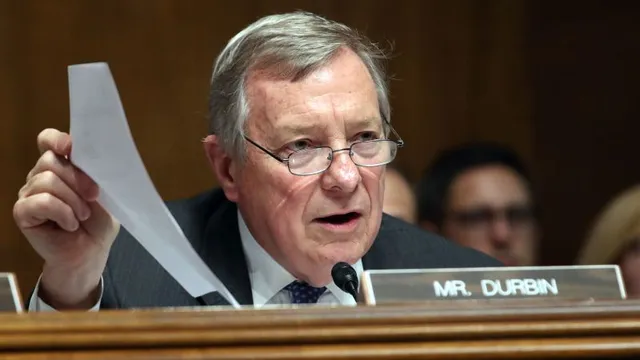
Dick Durbin announces retirement after decades in Congress
2025-04-25 10:08- Senator Dick Durbin of Illinois announced he will not run for reelection in 2026.
- Durbin has served in Congress for over four decades, including multiple terms in both the House and Senate.
- His retirement opens the door for new candidates in a competitive political landscape in Illinois.
Express your sentiment!
Insights
In April 2025, Dick Durbin, a prominent figure in American politics, announced his decision to retire from the Senate rather than run for reelection in 2026, marking the end of an extensive political career spanning over four decades. Born in 1944 in East St. Louis, Illinois, Durbin first entered Congress as a member of the House of Representatives in 1982, where he served seven consecutive terms before transitioning to the Senate in 1996. Throughout his tenure in Congress, he became known for his advocacy for various issues, particularly immigration reform, and for being a key player in major legislative developments such as the Deferred Action for Childhood Arrivals (DACA) program. Durbin emphasized the importance of passing the torch to the next generation of leaders and indicated that he felt it was the right time for his departure. His announcement set off a wave of speculation regarding potential successors, reflecting the competitive nature of Illinois politics, especially as the state has leaned Democratic in recent years. Durbin's retirement opens the door for various Democratic candidates who have already been preparing for a possible primary battle to fill his seat, which is crucial for maintaining party strength in the Senate. Among the expected contenders are notable figures like Representatives Raja Krishnamoorthi, Robin Kelly, Lauren Underwood, and Illinois Lieutenant Governor Juliana Stratton. Durbin's departure, coupled with other Democrats also deciding not to run in 2026, highlights a significant moment in the party's leadership and strategy moving forward, particularly as they aim to navigate a complex political landscape that could determine control of the Senate.
Contexts
The history of Senate leadership roles in the United States is a complex narrative that reflects the evolution of political power and the changing dynamics within Congress. The Senate, established in 1789, was designed to represent the interests of the states and their citizens. From its inception, leadership roles have emerged to facilitate order and function in an institution that values debate and deliberation. The Vice President serves as the President of the Senate, but this role primarily functions to cast tie-breaking votes, leading to the emergence of other leadership positions such as the Majority and Minority Leaders, who play crucial roles in legislative agenda-setting and party strategy within the Senate. The Majority Leader, elected by the party with the largest representation in the Senate, has evolved into a pivotal figure, coordinating the passage of legislation, managing floor debates, and serving as the chief spokesperson for the party's policies. The position gained prominence in the mid-20th century, when Senate leaders recognized the necessity of a structured approach to managing the increasingly complex legislative process. Prominent figures such as Lyndon B. Johnson and Harry Reid have shaped the role, utilizing it to forge bipartisan agreements while also advancing their party's agenda. Over the years, the relationship between the Majority Leader and their party's members has been dynamic, with leaders needing to balance party loyalty with broader legislative goals. Conversely, the Minority Leader's role is vital in maintaining party cohesion and providing a counterpoint to the Majority Leader. This position is essential for voicing dissenting opinions and rallying opposition against majority initiatives. The effectiveness of a Minority Leader depends significantly on their ability to negotiate and collaborate with the Majority Leader, as well as to unify their party's approach to legislation. Instances of notable Minority Leaders, such as Mitch McConnell and Chuck Schumer, demonstrate how this role can influence the Senate's legislation and political landscape, especially in times of divided government. Over time, Senate leadership has also increasingly recognized the importance of diversity and representation within its ranks. The inclusion of women and minority leaders has significantly changed the dynamics of Senate leadership roles, promoting a broader spectrum of voices in the legislative process. As political challenges evolve, adapting leadership approaches to reflect the changing demographics and political values of the American electorate has become essential. Today, Senate leadership continues to adapt, balancing tradition with the contemporary demands of governance and public representation, thereby ensuring that it remains a key institution in American democracy.